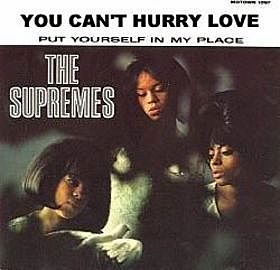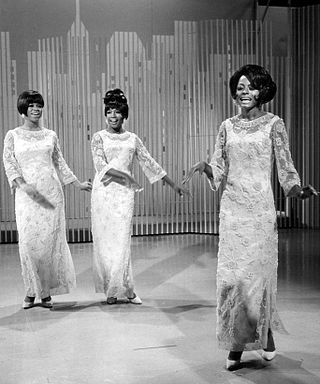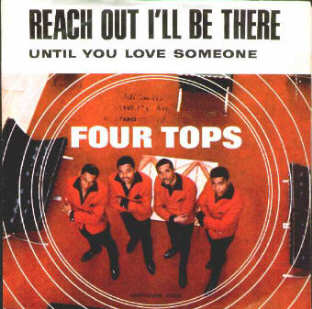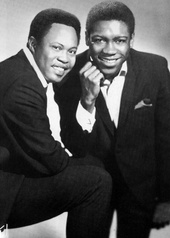
"I Heard It Through the Grapevine" is a song written by Norman Whitfield and Barrett Strong for Motown Records in 1966. The first recording of the song to be released was produced by Whitfield for Gladys Knight & the Pips and released as a single in September 1967. It went to number one on the Billboard R&B Singles chart and number two on the Billboard Pop Singles chart and shortly became the biggest selling Motown single up to that time.

"Stop! In the Name of Love" is a 1965 song recorded by the Supremes for the Motown label.

"Baby Love" is a song by American music group the Supremes from their second studio album, Where Did Our Love Go. It was written and produced by Motown's main production team Holland–Dozier–Holland and was released on September 17, 1964.

"You Can't Hurry Love" is a 1966 song originally recorded by the Supremes on the Motown label. It was released on July 25 of 1966 as the second single from their studio album The Supremes A' Go-Go (1966).

"You Keep Me Hangin' On" is a song written and composed by Holland–Dozier–Holland. It was first recorded in 1966 by American Motown girl group the Supremes, reaching number one on the Billboard Hot 100. American rock band Vanilla Fudge released a cover version in June the following year, which reached number six on the Billboard Hot 100. English singer Kim Wilde covered "You Keep Me Hangin' On" in 1986, reaching number one on the Billboard Hot 100 in June 1987. In the first 32 years of the Billboard Hot 100 rock era, "You Keep Me Hangin' On" became one of the six songs to reach number one by two different musical acts. In 1996, American country singer Reba McEntire's version reached number two on the US Billboard Hot Dance Club Play chart. The BBC ranked the Supremes' original song at number 78 on The Top 100 Digital Motown Chart, which ranks Motown releases by their all-time UK downloads and streams.

American girl group The Supremes have released 29 studio albums, four live albums, two soundtrack albums, 32 compilation albums, four box sets, 66 singles and three promotional singles. The Supremes are the most successful American group of all-time, and the 26th greatest artist of all time on the US Billboard charts; with 12 number-one songs on the Billboard Hot 100 and three number-one albums on the Billboard 200. The Supremes were the first artist to accumulate five consecutive number-one singles on the US Hot 100 and the first female group to top the Billboard 200 albums chart with The Supremes A' Go-Go (1966). In 2017, Billboard ranked The Supremes as the number-one girl group of all-time, publishing, 'although there have been many girl group smashes in the decades since the Supremes ruled the Billboard charts, no collective has yet to challenge their, for lack of a better word, supremacy.' In 2019, the Official Charts Company placed 7 Supremes songs—"You Can't Hurry Love" (16), "Baby Love" (23), "Stop! In The Name Of Love" (56), "Where Did Our Love Go?" (59), "You Keep Me Hangin' On" (78), "Come See About Me" (94) and "Stoned Love" (99)—on The Official Top 100 Motown songs of the Millennium chart, which ranks Motown releases by their all-time UK downloads and streams.

"Reach Out I'll Be There" (also formatted as "Reach Out (I'll Be There)") is a song recorded by the Four Tops from their fourth studio album Reach Out (1967). Written and produced by Motown's main production team, Holland–Dozier–Holland, the song is one of the most widely-known Motown hits of the 1960s and is today considered the Four Tops' signature song.

American singer Mariah Carey has released 86 official singles, 22 promotional singles, and has made 30 guest appearances. Her self-titled debut album in 1990 yielded four number-one singles on the Billboard Hot 100, the first being "Vision of Love", a song credited with revolutionizing the usage of distinguished vocal stylings, predominantly the practice of melisma, and effectively influencing virtually every female R&B performer since the 1990s. Subsequent singles "Emotions" (1991) and Carey's cover of the Jackson 5 track, "I'll Be There" (1992) continued the singer's streak of US number-one singles, with the latter becoming her fourth chart-topper in Canada and first in the Netherlands. With the release of Carey's third studio album, Music Box (1993), the singer's international popularity surged upon release of "Hero" and the album's third single, her cover of Harry Nilsson's "Without You", which became the singer's first number-one single in several countries across Europe.

American singer Beyoncé has released seven studio albums, five live albums, three compilation albums, five EPs, one soundtrack album, two karaoke albums, and 83 singles. To date, Beyoncé has sold over 200 million records worldwide as a solo artist, and a further 60 million as part of Destiny's Child, making her one of the best-selling music artists of all time. Billboard ranked her as the 37th greatest artist of all time.

"4 Seasons of Loneliness" is a song by Philadelphia-based vocal quartet Boyz II Men. Written and produced by Jimmy Jam and Terry Lewis, the song was issued as the first single from their fourth studio album, Evolution (1997), on September 8, 1997.

"The Happening" is a 1967 song recorded by Motown artists The Supremes. It served as the theme song of the 1967 Columbia Pictures film The Happening, and was released as a single by Motown at the time of the film's release that spring. While the movie flopped, the song peaked at number 1 on the Billboard Hot 100 pop singles chart in May, becoming The Supremes' tenth number 1 single in the United States, peaking in the top 10 on the UK Singles Chart at number 6, and in the top 5 in the Australian Pop Chart and in the Dutch Pop Chart.

The discography of Canadian rapper and singer Drake consists of seven studio albums, three compilation albums, four extended plays, seven mixtapes, 141 singles, five promotional singles and 84 music videos. His music has been released on record labels Universal Motown Records and Republic Records, along with subsidiaries Young Money Entertainment, Cash Money Records and OVO Sound. With 170 million records sold worldwide, he is among the best-selling music artists in history. Drake has achieved eleven number-one albums on the Billboard 200 and twelve number-one hits on the Billboard Hot 100. Billboard hailed him as the "Artist of the 2010s Decade" and the 16th Greatest Artist of all time. RIAA ranks him as the 2nd top-selling digital artist of all time with 164 million in the United States. He has the most number one singles on both the US Hot Rap Songs chart and the US Hot R&B/Hip-Hop Songs chart.

"Where Did Our Love Go" is a 1964 song recorded by American music group the Supremes for the Motown label.

















